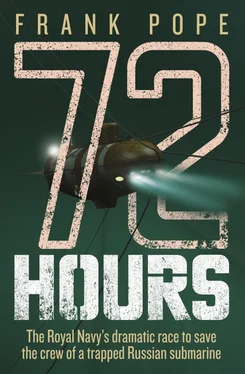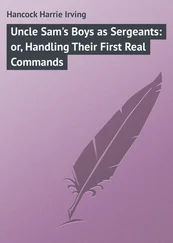This was all routine work, but that wasn’t what the 44-foot AS-28 was designed for. She was a rescue submersible. The flexible skirt that fitted to her bulky, downward-facing hatch to enable her to dock with stricken submarines had been removed, but her bulbous rear pressure chamber was still there, able to hold 20 rescued sailors at pressure, but doing no favours for her speed and manoeuvrability.
Manipulators extended from her bow like the forearms of a praying mantis. Designed to be able to clear debris from an escape hatch, they also allowed her to moonlight as a maintenance vehicle. It was working with these manipulators that Captain Lieutenant Milachevsky excelled: he prided himself on his precision with their claws. When he’d first practised – with AS-28 on deck and the ship still in port – he’d smashed many of the bottles he’d been trying to pick up. But now he felt like he could thread a needle with the big titanium claws if Mother Russia required it of him.
Milachevsky’s eyes flicked between the porthole in front of him and those to either side. Down here the water was clear, allowing the submersible’s lights to shine almost ten metres into the darkness to his left. Ordinarily he’d be flying using the sonar, the submariner’s sixth sense that let him see far into the blackness. But right now he was navigating by sight alone. Through the starboard porthole he could see a vast wall of steel gliding past. The cylinder had acquired a dense camouflage of barnacles since its installation, but nothing could disguise its vast bulk on the sonar readout that pulsed by his left knee. It was as though half of the screen was malfunctioning – it had turned solid green.
He shook off the creeping fatigue and pushed his shoulders back. His father had once sat in the same seat as he did now, also as the pilot of this submersible. Small, manoeuvrable and with the distinctive red-and-white striped hull of the Navy’s rescue fleet, the AS-28 had a place deep in the young pilot’s heart. As a boy he’d watched his father step on board, and as a teenager had carved models of her during his long absences. Now he was at the helm.
What’s more, crouched beside him was Gennady Vasiliyevich Bolonin. Bolonin was not a military man, but Milachevsky was proud to be piloting with him on board: he was the deputy chief designer at the esteemed Lazurit Design Bureau, and had been one of the principal members of the design team behind AS-28.
The fact that there were seven men on board made no difference to Milachevsky – it just meant an audience to appreciate his skills. The weight gain was negligible in the water, and the fact that their 120-hour emergency endurance would be almost halved made no difference – they were progressing well, and their mission should be over within the hour.
Standing on the bridge of the 427-foot-long, 7,960-tonne salvage submersible support ship Georgy Kozmin, 2nd Rank Captain Viktor Novikov scowled and lowered his binoculars. Despite the clear August air he couldn’t make out the fishing boat’s name through the rust that spread over the transom like lichen on old rock. He swore and stormed inside to hail the unknown boat on the VHF radio, but got no response. He might have guessed. There was no way of knowing if they were ignoring their radio or if it was broken. He could have sent one of the ship’s boats to find out what they were doing, but it was a risk. If she broke down and needed rescuing, he’d have nothing left with which to recover the submersible. He shook his head, as if to rid himself of the irritation. There was nothing he could do even if he had been able to identify the boat. There was no way to tell if she had been trawling in this area or not. He’d caught others before, had them hauled before the Ministry and reprimanded. They knew it was illegal to fish in this top-secret area but still they came. The giant metal structures hidden beneath the surface created a haven for marine life and, for the fishermen, the quantity and size of the fish they caught there was evidently just too tempting.
Novikov turned and squinted into the sun, his practised eye scanning over the rusting deck . It had taken him twenty years of serving the Great Russian Navy to be given this command, but now he’d made it he almost wished he hadn’t. Here he was in August, when all other self-respecting Russians were at their holiday homes, their dachas , and he had been pushed into servicing the array. The Kozmin was originally a timber-carrier refitted as a submarine rescue ship. Neither she nor the equipment she had on board were suitable for work as an underwater repair and maintenance vessel. Her mini-submersibles were built to save sailors from stricken nuclear boats, not for running maintenance duty on enormous underwater hydrophones. But it was the same old story everywhere in the Navy, throughout the Russian military: the infrastructure behind the nation’s threatening and impressive profile was disintegrating.
He knew he should count himself lucky. Most of the surface fleet had not seen any money since 1991 thanks to the Navy’s focus on nuclear-powered, ballistic-missile-carrying submarines, a policy that meant at least a trickle came through to the rescue fleet. That did nothing to ease his tension. The feeling was down to the Kozmin ’s barren stern deck. AS-28 ’s sister submersible was 70 kilometres away, sitting on a dockside on wooden stocks, waiting for repairs. Ordinarily, launching one without the other ready to rescue her contravened all the training he’d undertaken at the Naval academy. Even AS-28 should not have been launched, strictly speaking, given the maintenance that was due on her. And she shouldn’t have been sent to do the kind of work he’d been asked to undertake. To cap it all, it was August and everyone was on holiday, including some of his best men. They got paid so little, the least he could do was let them take their precious August holiday.
Thursday, 4 August
16.00 Kamchatka
Petropavlosk-Kamchatsky
Queuing at the bakery on the ground floor of a featureless concrete apartment block in the south of Petropavlovsk, Tatiana Lepetyukha finally reached the counter to find the woman in front of her had bought the last loaf. It would be two hours before a new batch would be ready. Tatiana pursed her lips and sniffed sharply. Nothing had been going right so far today.
It was never going to be a pleasant day. Her husband, Valery Lepetyukha, had been sent down in a Priz submersible for the first time in years despite his ill-health. She’d hoped these days – and the nervous feelings that always accompanied them – were over. As the wife of a Captain 1st Rank in the Russian Navy, she should be spared indignities like queuing for bread that ran out when she got to the counter, or having a car that refused to start. But there was something else, too, nagging her, that she couldn’t put her finger on. The sun had been bright as she made her way to church to say her morning prayers, and there hadn’t been a breath of wind on the streets. Maybe that was it. Maybe it was just too calm, too much of a contrast with the normal north-eastern weather.
As a sailor’s wife she’d come to trust omens and portents. The sea was in her family’s blood, going back as far as anyone could remember. The past three generations of men had been in the Navy, and she’d learnt to listen to what her heart was telling her. And right now something deep down in her body was worrying her. It wasn’t that she didn’t have faith in her husband: she had complete confidence in him. She also trusted in the Navy that her family had served for so long, or so she told herself. But though she believed wholeheartedly in the Russian Navy’s intentions, she could not entirely ignore the breakdowns and Valery’s private complaints. He and the crews were working hard, but there was no money to repair any of the things that needed repairing. Given the risks they ran while working, it didn’t seem right. Strong though her patriotism was, her love for her husband was greater.
Читать дальше












